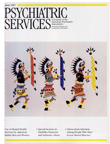Monetary reinforcement of abstinence from cocaine among mentally ill patients with cocaine dependence
Abstract
OBJECTIVE: The study investigated whether contingency management could reduce cocaine use by patients with schizophrenia. METHODS: An A-B-A research design, with two-month baseline, intervention, and follow-up phases, was used to study two homeless, treatment-resistant male outpatients with DSM-III-R diagnoses of schizophrenia and cocaine dependence. During the intervention phase, subjects provided daily urine specimens for testing for the cocaine metabolite benzoylecgonine (BE) and received $25 for each negative test. Concentrations of BE and metabolites of other illicit drugs were assayed twice a week to determine the amount of drug use in addition to frequency. Analysis of variance was used to compare drug use during the three study phases. RESULTS: During the intervention, the proportion of tests positive for cocaine was lower for both subjects. Mean urinary concentrations of BE were significantly lower during the intervention than during the baseline. CONCLUSIONS: These results suggest that modest monetary reinforcement of abstinence may decrease cocaine use among cocaine- dependent patients with schizophrenia.



